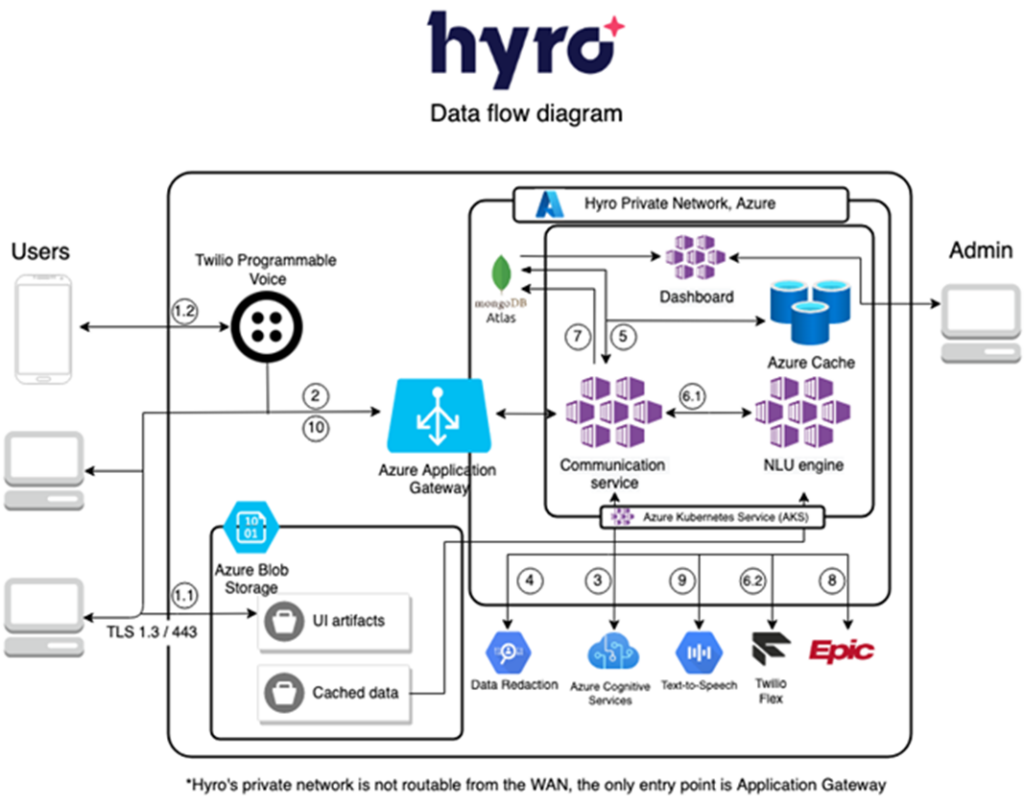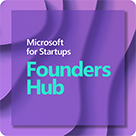As demand for AI services grows rapidly, businesses across industries seek to leverage its power to drive innovation and gain a competitive edge. Hyro is a Microsoft for Startups portfolio startup that provides plug-and-play conversational AI to enable enterprises to streamline their processes and messaging across their most valuable platforms, services, and channels—including call centers, chat solutions, SMS, and more. Their mission is to simplify digital interactions by enabling organizations to deploy conversational interfaces at scale both in text (SMS, web) and voice (call center) channels.
Scaling and expanding AI services can be a challenge, however, especially when you need to maintain the high level of quality your clients expect. While Hyro recently enjoyed growing demand among call centers for their Adaptive Communications Platform, which includes automatic speech recognition (ASR) solutions and natural language understanding (NLU) capabilities, they were also faced with evidence of caller dissatisfaction with speech-to-text (STT) transcription. Faced with this challenge, Hyro found a path to maintaining their high level of quality by employing key Microsoft Azure tools, such as STT, Kubernetes, and eventually Azure OpenAI Service.
Their utilization of Azure services would eventually save them weeks of human labor, help them develop new capabilities that differentiated their solution in the market, and bring them an elevated level of interest and attention from clients.
Search for new AI services leads to a ‘game changer’
Although Hyro’s AI-powered assistants were enabling customer service operations to quickly solve customer issues, the company was facing STT transcription issues, resulting in a higher volume of calls being transferred to agents. This was frustrating for callers, who would often hang up the phone due to poor user experience.
Concerned that these issues were harming their reputation for quality, Hyro sought to improve their conversational AI. They needed to build a speech-to-text solution that could match the needs of their clients across verticals and segments. Hyro eventually turned to Azure services, taking advantage of tools like Azure Speech to Text, Azure Kubernetes Service, Azure Blob Storage, Azure Cache for Redis, and Azure OpenAI Service.
“We conducted an extensive search, evaluating quite a few different vendors along the way,” said Hyro’s chief architect Nitzan Bar. “The fact that Azure allowed us to easily train a custom model for each question we ask the end-user, like a yes/no question versus a number-related question, was really a game changer for us.”
Bar praised Azure OpenAI Service, pointing out a recent case where the service proved invaluable. In one, Hyro needed a way to collect dates of birth from users—which is trickier than it sounds, given the different orders that people around the world input the day, month, and year of their birthdays. By using Azure OpenAI Service’ completion models, Hyro created a prompt that included multiple date iterations that resulted in a high extraction rate with only a few hours of work.
Bar says there is no matching Azure OpenAI Service’s capabilities, and no competitors currently on the market can match it.
“It has brought a lot of value to the company, mainly in terms of development speed,” Bar says. “Things that would take us a couple of days or weeks to achieve now take less than a day’s work.”
Using Azure services to deliver seamless communications
With Azure services, Hyro can deliver high-quality conversational AI experiences that match their clients’ unique needs and provide seamless communication experiences for users across different platforms, services, and channels.
Azure Speech to Text: Hyro works with telephone providers to answer and resolve incoming audio data from inbound calls and trains the audio data on a custom speech model for transcription using Bing’s Speech-to-Text. The service helps Hyro transcribe speech from various sources, including microphones, audio files, and cloud storage, into text in over 100 languages. Hyro’s NLU engine can then use the transcription to generate automated responses with up-to-date data. Speech models can be deployed both in the cloud or at the edge in containers and trained to understand organizational and industry specific terminology.
It is now even possible to train different models for different information the assistant is trying to extract from the user. For example, Hyro might have a model suitable for collecting yes/no answers to questions and another collecting numbers and dates. The solution is simple: Hyro just needs to provide data (audio and tagging), and the training pipeline is abstracted away.
Visit the Azure site for more on Azure Speech to Text.
Azure Blob Storage and Azure Cache for Redis: On startup, the NLU engine loads cached data from Azure Blob. The data and communication flow on a user’s request connects to Hyro using Twilio Programmable Voice to manage communications with the user and record the calls. If the user’s query was transmitted through voice, it is transmitted to Azure’s Speech-to-Text service.
Then the anonymous auto-generated user ID is cached using Azure Cache for Redis, and the user’s query is saved in MongoDB Atlas. The Communication Service then directs the user’s utterance to the service that generated the answer using the NLU-engine as the default service or Twilio Flex if the user asked to talk with an agent.
Visit the Azure site for more on Azure Blob Storage and Azure Cache for Redis.
Azure Kubernetes Service (AKS) and Azure OpenAI Service: A fully managed Kubernetes service with integrated CI/CD plus enterprise-grade security and governance, Hyro utilizes AKS in a number of ways:
- Elastic provisioning of capacity with the ability to add event-driven autoscaling
- Faster end-to-end development experience
- Comprehensive authentication and authorization capabilities
Starting in March 2023, Hyro began transitioning to Azure OpenAI Service for its robust compliance advantages after having used the service before it was available by Microsoft. Azure OpenAI Service allows developers to discover the art of the possible with cutting-edge models from OpenAI and take their use-cases to production with the enterprise-grade reliability, security and global availability that comes with Microsoft Azure.
Bar says the company is planning to launch new capabilities based on Azure OpenAI that previously were out of their scope, including a new Q&A space that is already garnering interest from their clients in alpha versions.
Visit the Azure site for more on Azure Kubernetes Service and Azure OpenAI Service.
With Azure’s services, Hyro was able to deliver high-quality conversational AI experiences that match their clients’ unique needs and provide seamless communication experiences for users across different platforms, services, and channels. By training audio data on a custom speech model for transcription, the company used their NLU-engine to generate automated responses with up-to-date data.
For more tips on leveraging AI for your startup and for access to Azure’s AI services, sign up today for Microsoft for Startups Founders Hub. Members receive Azure cloud credits that can be used toward Azure OpenAI Service or OpenAI to help build their product.












